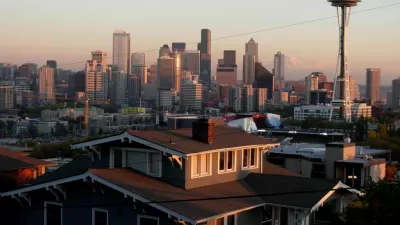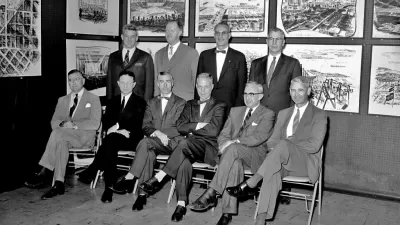The debate about police reform in Minneapolis is only one arena for the city's reckoning with systemic racism.

The protests sweeping the nation started in Minneapolis, a city that has frequently taken the lead on matters of social and economic justice among U.S. cities. But that track record hasn't done enough to overcome the discriminatory underpinnings of the racist housing covenants that stacked the economic deck against Black residents and people of color in the city.
According to an article by Jared Brey, volunteers working for the Mapping Prejudice project, first reported by Next City in 2017, have uncovered evidence of the "deep racial inequalities that contradict the city’s self-image as a bastion of progressive politics."
The city has increased funding for its Affordable Housing Trust Fund since 2018 and approved an innovative comprehensive plan to implement a supply-side approach to housing affordability by legalizing new Missing Middle density in residential neighborhoods across the city. "But housing advocates are still trying to push through tenant protections like just-cause eviction rules and rent control, while acknowledging that housing inequality can’t be undone by housing policy alone," according to Brey.
Led by The Alliance, a coalition of community groups focused on regional equity, advocates in Minneapolis are pushing for the Equity in Place policy agenda, "which would give tenants the right of first refusal when their building owner plans to sell, similar to laws in Washington, D.C., and San Francisco," according to Brey. "The agenda also includes community control of land and housing through community land trusts, reforming tenant-screening processes, and increasing funding for community organizing work."
FULL STORY: Facebook Twitter Email Minneapolis Housing Advocates Look Ahead

Planetizen Federal Action Tracker
A weekly monitor of how Trump’s orders and actions are impacting planners and planning in America.

Map: Where Senate Republicans Want to Sell Your Public Lands
For public land advocates, the Senate Republicans’ proposal to sell millions of acres of public land in the West is “the biggest fight of their careers.”

Restaurant Patios Were a Pandemic Win — Why Were They so Hard to Keep?
Social distancing requirements and changes in travel patterns prompted cities to pilot new uses for street and sidewalk space. Then it got complicated.

Platform Pilsner: Vancouver Transit Agency Releases... a Beer?
TransLink will receive a portion of every sale of the four-pack.

Toronto Weighs Cheaper Transit, Parking Hikes for Major Events
Special event rates would take effect during large festivals, sports games and concerts to ‘discourage driving, manage congestion and free up space for transit.”

Berlin to Consider Car-Free Zone Larger Than Manhattan
The area bound by the 22-mile Ringbahn would still allow 12 uses of a private automobile per year per person, and several other exemptions.
Urban Design for Planners 1: Software Tools
This six-course series explores essential urban design concepts using open source software and equips planners with the tools they need to participate fully in the urban design process.
Planning for Universal Design
Learn the tools for implementing Universal Design in planning regulations.
Heyer Gruel & Associates PA
JM Goldson LLC
Custer County Colorado
City of Camden Redevelopment Agency
City of Astoria
Transportation Research & Education Center (TREC) at Portland State University
Camden Redevelopment Agency
City of Claremont
Municipality of Princeton (NJ)





























